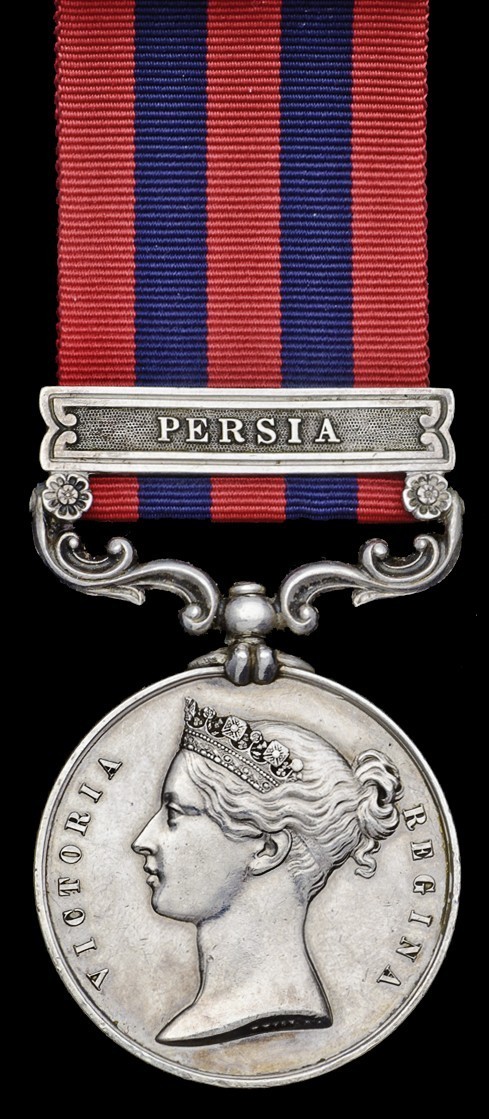
Auction: 14001 - Orders, Decorations, Campaign Medals and Militaria
Lot: 533
India General Service 1854-95, one clasp, Persia (Capt. C.P. Rigby, Supt. Bazaars.), good very fine, a unique rank and unit combination, together with a copy of General Rigby, Zanzibar and the Slave Trade, edited by the recipient's daughter, Mrs. Charles Russell, which included extracts from the recipient's journals and despatches throughout his life
Major-General Christopher Palmer Rigby, (1820-85), was born at Yately Lodge, Yately, Hampshire, and educated at Abingdon Grammar School and Addiscombe. Commissioned an Ensign in the 5th Regiment of Native Infantry, 1836, he remained in India, except for a posting in Aden from 1840 to 1843, until 1850. During these years of service overseas he acquired fluency in eight oriental and African languages. In 1853 he visited Russia, and whilst in St. Petersburg was granted an audience with the Czar, 'who talked to him for about twenty minutes on various subjects connected with India, asking particularly about the organisation of our Native Army, the fortifications of Aden, our treatment of cholera &c.' (General Rigby, Zanzibar, and the Slave Trade, edited by his daughter, Mrs. Charles Russell refers). After a period of leave back in England, he returned to India via Constantinople, arriving back in April 1854, and was appointed President of the Civil and Military Examination Committee for native languages, his latest recreation being the study of Turkish.
In September 1855 Rigby embarked for the Persian Gulf on a secret service mission, whilst holding the official title of Superintendent of Bazaars and Police. On his arrival he was asked if he would take charge of the town of Bushire. 'His big challenge was how to govern the populous city. Not the slightest preparation for such a situation had been made by the Bombay authorities. Not a policeman, or even a single pair of handcuffs, had been sent. Undeterred, Rigby engaged a house, erected a flagstaff, and established a Police Office, himself being the only policeman! He immediately issued a notice liberating all slaves and forbidding the sale of liquor to our soldiers and sailors. There being no gaol, summary punishment by public flogging was the only resource. He at once set about enlisting Persians to form a Police Corp, and at the first opportunity ordered from Bombay uniform and equipment for 200 men. Complaints were made by Armenian ladies that they were unable to appear in the streets during the day as they were insulted by Persians. To put a stop to this, Rigby procured the disguise of a lady. He mixed with a party of Armenian ladies, and followed by two of his policemen, armed with a hidden rope and cat-o'-nine tails, strolled through the main streets. Any Persian using insulting language found himself suddenly seized from behind, tied up to the nearest door-post, and given two dozen lashes. This soon put a stop to the annoyance of the Armenian ladies.' (ibid).
Rigby was in Persia, based at Bushire, throughout the Persian Campaign, during which he was appointed variously Military Commandant, Civil Commissioner, Magistrate, and Superintendent of Bazaars and Police. For his service in Persia he was Mentioned in the farewell General Order issued on the break-up of the Persian Expeditionary Force by General Jacob: 'The services of this officer have been most valuable. He has very greatly improved the town of Bushire, and has maintained justice, peace, quiet, and excellent order among the inhabitants. His duties have been of a most delicate and important nature, he has been most zealous and industrious in their performance, and he is well worthy of a favourable notice', and was Mentioned in Major-General Stalker's Despatch. He returned to Bombay in February 1858, and was thus the first to embark from India and the last to quit Persian territory during the Persian War.
After returning to Bombay in 1858 Rigby was appointed the East India Company's agent in Zanzibar and British Consul, arriving in July 1858. Whilst stationed in Zanzibar he met and assisted several celebrated explorers, including Burton, Speke, Livingstone, and Grant. He also worked with ardour to suppress the traffic in slaves and his efforts to enforce the 1845 treaty which restricted the East African slave-trade were unremitting. Furthermore, he ordered the emancipation of all slaves owned by British subjects residing in Zanzibar; it is estimated that he set free 8000 slaves up to the time of his leaving Zanzibar.
In September 1861 Rigby left Zanzibar because of ill health and returned to England. In January 1864 he was appointed commissioner for the settlement of boundary disputes between the states of Baroda and Jamnagar. He resigned from the army in August 1867 with the rank of major-general, and retired to London. He died at his home in Portland Place; shortly before his death he lost all his savings in the collapse of the Oriental Bank.
Subject to 20% VAT on Buyer’s Premium. For more information please view Terms and Conditions for Buyers.
Sold for
£2,000




